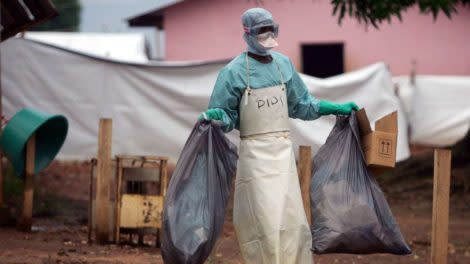Ghana Detects First Cases Of Deadly Marburg Virus, Here's What You Need To Know

According to the World Health Organization, another virus has entered the chat. Marburg virus has joined COVID-19 and monkeypox on the list of highly infectious viruses.
The first case was reported in Ghana. The WHO says that two unrelated people have died after testing positive for Marburg. They were both located in the southern Ashanti region of Ghana.
Matshidiso Moeti, the WHO’s regional director for Africa says, “Health authorities have responded swiftly, getting a head start preparing for a possible outbreak. This is good because, without immediate and decisive action, Marburg can easily get out of hand.”
#Ghana 🇬🇭 anounces country’s 1rst outbreak of Marburg virus disease, after a @WHO Collaborating Centre lab confirms earlier results. WHO is supporting Ghana by deploying experts, providing PPEs, bolstering disease surveillance, working w. communities ➡️ https://t.co/9PfRkyCW7i
— WHO African Region (@WHOAFRO) July 17, 2022
Health officials in the West African country say they are trying to stop the spread of the virus. Those who have been in close contact with the infected individuals are isolating. WHO is sending resources and specialists to Ghana.
There is no vaccine for Marburg and fatality rates can reach about 90 percent.
Related: Jamaica’s First Monkeypox Patient Escapes May Pen Hospital To ‘Enjoy Vacation’
What is Marburg?
This rare virus is in the same family as Ebola and causes a viral hemorrhagic fever. Depending on the strain and the amount of care a patient gets, fatality rates can range from 24 to 88 percent.
The virus is not airborne and was most likely transmitted from African fruit bats to people working in mines and caves that have these bat colonies.
Once a person is infected with Marburg, they can spread the virus to others through blood, urine, saliva, and other bodily fluids. The virus can also be spread on surfaces and materials. Bodies have the possibility to still be contagious at burial.
The first documented cases of Marburg were in 1967 in Europe. Marburg and Frankfurt, Germany as well as Belgrade, Serbia had two large outbreaks. There were about seven deaths reported during the first outbreak. According to the CDC, the first people infected were exposed to African green monkeys imported from Uganda for lab research.
Marburg in Africa
The first detected Marburg case in West Africa was last year in Guinea. The virus has the possibility of spreading rapidly. Currently, there are over 90 people comprised of the community and health workers who are being monitored. The WHO has put surrounding high-risk countries on alert.
Previously there have been Marburg cases in other African countries including Angola, the Democratic Republic of Congo, Kenya, South Africa, Uganda, and Zimbabwe. Over 200 people died from a Marburg outbreak in Angola in 2005.

Although Marburg hasn’t been known to be native in North America, an American tourist contracted the virus after visiting a cave in Uganda. The cave, located in a national park, was inhabited by fruit bats.
Symptoms of Marburg
Those infected with Marburg will feel symptoms almost immediately. According to the WHO, symptoms include a high fever, severe headaches, and extreme discomforts, such as cramps and muscle aches.
Around day 5, people can possibly get a non-itchy rash on their chest, back, and stomach, according to the CDC. Many of the symptoms of Marburg are similar to typhoid fever and malaria, so it can be difficult to diagnose.
The two people who died in Ghana experienced fever, diarrhea, nausea, and vomiting. One of the individuals was a 26-year-old man who died a day after checking into a hospital on June 26. The WHO reports the second case was a 51-year-old man who checked into the hospital on June 28 and died the same day.
Marburg can become fatal after eight to nine days of contracting the virus. People experience severe blood loss and multi-organ dysfunction.
Is there a cure?
There are currently no cures or vaccines for the virus. Infected individuals can survive by maintaining oxygen levels and staying hydrated.
The CDC says that experimental treatments for the virus have been tested on animals, but never in humans.
The next steps
The WHO is sending its experts to Ghana to support a “joint national investigative team” as well as sending personal protective equipment and doing contact tracing.
There is a WHO Africa online briefing scheduled for Thursday.
Related: Chance The Rapper, Vic Mensa Make Good On Promise To Take Kids To Ghana

